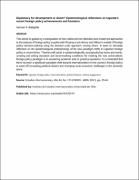| dc.contributor.author | Baligidde, Samuel H. | |
| dc.date.accessioned | 2018-12-18T12:24:07Z | |
| dc.date.available | 2018-12-18T12:24:07Z | |
| dc.date.issued | 2012-04 | |
| dc.identifier.issn | 0716-0240 | |
| dc.identifier.issn | URL: http://www.jstor.org/stable/41970579 | |
| dc.identifier.uri | http://hdl.handle.net/20.500.12280/1272 | |
| dc.description.abstract | This article is guided by a triangulation of neo-realist and neo-liberalist post-modernist approaches to the analysis of foreign policy coupled with Rosenau's pre-theory and Allison's models of foreign policy decision- making using the decision units approach, among others. It seeks to stimulate reflection on the epistemological underpinnings of the new paradigm shifts in Uganda's foreign policy in recent times. Theories will assist in epistemologically conceptualizing issues and events, creating and setting standards and benchmarking conditions for meeting the new universalistic foreign policy paradigm or in answering academic and practical questions. It is contended that there has been a significant paradigm shift towards internationalism in the country's foreign policy to ward off increasing political dissent and emerging socio-economic challenges in the domestic arena. | en_US |
| dc.language.iso | en | en_US |
| dc.publisher | Instituto de Estudios Internacionales Universidad de Chile | en_US |
| dc.subject | Uganda | en_US |
| dc.subject | Foreign policy | en_US |
| dc.subject | Internationalism | en_US |
| dc.subject | Ppolitical dissent | en_US |
| dc.subject | Military engagement | en_US |
| dc.title | Diplomacy for development or doom? Epistemological reflections on Uganda's recentforeign policy achievements and blunders | en_US |
| dc.title.alternative | La diplomacia al servicio del desarrollo.Reflexiones epistemológicas sobre los recientes logros y tropiezos en materia de política enUganda | en_US |
| dc.type | Article | en_US |


